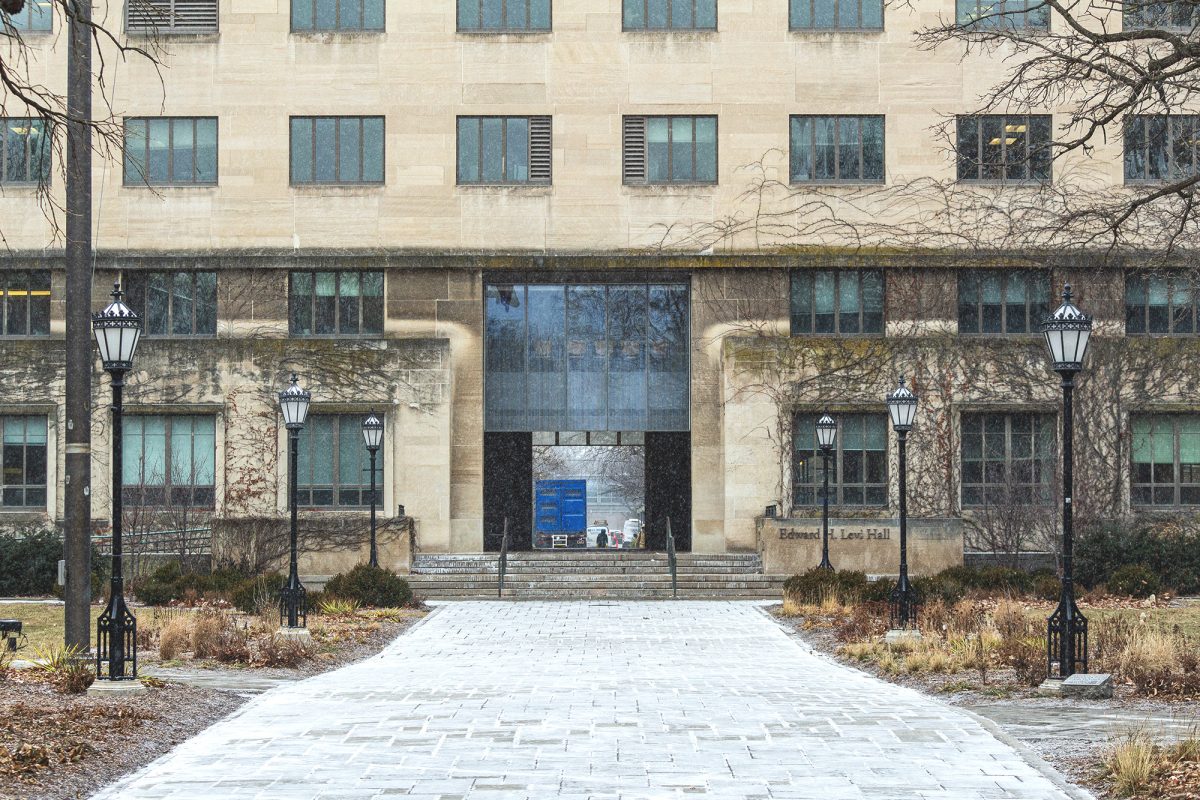
Nathaniel Rodwell-Simon
Edward H. Levi Hall, which houses many of the University’s administrative offices.
Fourth-year Manuel Rivera filed a civil rights complaint against the University, Interim Dean of Students in the University Michael Hayes, and two unnamed University of Chicago Police Department (UCPD) officers on January 14, according to court documents reviewed by the Maroon. The complaint alleges that the University’s decision to remove Rivera from on-campus housing and place him on an involuntary leave of absence was a violation of the First Amendment and of Illinois and Chicago housing law.
This is the first lawsuit and second civil rights complaint filed against the University in relation to pro-Palestine activism in the past year. The first complaint, filed by Palestine Legal in August on behalf of UChicago United for Palestine (UCUP), alleged that the University has engaged in “different treatment of Palestinian students and their allies” and “has reinforced [a] hostile anti-Palestinian environment” on campus.
Sheryl Weikal, the attorney representing Rivera, previously filed suit against Illinois State University (ISU) in August on behalf of seven students who received interim suspensions and no-trespass orders from ISU following their participation in a pro-Palestine protest. She declined to comment on the record about Rivera’s case or any of its specifics, citing the pending nature of litigation.
“Although Plaintiff was evicted on October 21, 2024, Defendants falsified their own records to indicate Plaintiff was given until December 9, 2024 to vacate,” the complaint alleges.
The University declined to comment on the complaint or any of its allegations, citing the pending nature of litigation.
Rivera has accused the University, Hayes, and the two unidentified UCPD officers of one count of “Unlawful First Amendment Retaliation” and one count of “Unlawful Eviction in Tort.”
He has also accused the University and Hayes of one count of “Violations of Chicago Municipal Code 5-12-160,” which regulates landlord interference with tenants’ access to dwellings. He has accused the two UCPD officers of one count of “Violations of 42 U.S.C. 1983,” under which he can sue the officers for participating in the deprivation of his civil rights by carrying out his removal from housing.
Rivera has requested “not less than $50,000 per Plaintiff” for the first three counts, in addition to “costs, attorney fees, and whatever additional relief this Court deems appropriate.” The fourth count requests “not less than $10,000,” plus costs, fees, and any other additional relief deemed appropriate.
Rivera’s complaint states that “on or about October 11, 2024… he observed a group of students peacefully protesting against the ongoing genocide of Palestinians in Israeli-Occupied Gaza…. Plaintiff participated in the protest as it was peaceful and occurring in a public place.”
On October 11, UCUP hosted a rally in recognition of the one-year anniversary of the Israel-Hamas War. The rally began on the main quad, after which demonstrators locked Cobb Gate and vandalized University property.
UCPD detained an unknown protester, sparking physical confrontations between police and protesters. Officers used pepper spray and batons on the crowd, while protesters physically engaged with police in an effort to prevent them from making arrests.
Photographs captured by the Maroon during the protest show Rivera kicking a Chicago Police Department (CPD) officer in the back of the leg.
Rivera was charged with the battery of a CPD officer in connection with his alleged actions during the protest. A Grand Jury has since indicted Rivera on one count of aggravated battery of a peace officer under Illinois state law, according to court documents reviewed by the Maroon.
According to the complaint, the University’s actions constitute unlawful retaliation under the First Amendment. The complaint states that “Plaintiff peacefully and silently engaged in a protest in a public forum, which is First Amendment protected activity” and that any punishments imposed on Rivera were “imposed solely because the Plaintiff was protesting against Israel.”
The complaint also alleges that the University’s actions constitute a violation of Illinois housing law and the Chicago Residential Landlord and Tenant Ordinance (CRLTO). Under CRLTO, “it is unlawful for any landlord or any person acting at his direction knowingly to oust or dispossess or threaten or attempt to oust or dispossess any tenant from a dwelling unit without authority of law.”
“University deans instructed Plaintiff that he was required to vacate his dormitory immediately as he was being placed on involuntary leave due to his participation in the protest of October 11, 2024,” the complaint reads. According to the complaint, deans told Rivera that he should leave campus “voluntar[ily],” but that UCPD officers would arrest him if he did not comply.
“As a direct and proximate result of Defendants’ actions,” the complaint reads, “Plaintiff was made homeless,” adding that Rivera has since “suffered from hunger and homelessness for months.”
CRLTO provides several exemptions from the ordinance, including for “student housing accommodations wherein a housing agreement or housing contract is entered into between the student and an institution of higher learning” unless “the rental agreement thereof is created to avoid the application of this chapter.”
According to UChicago’s 2024–25 student housing contract, the contract “shall be governed by and construed in accordance with the laws of the State of Illinois, without regard to its choice of law principles, and the parties agree to personal jurisdiction and venue in the state and federal courts located in Cook County, Illinois, in any suit or proceeding arising out of the subject matter of this Contract.”
Jeff Leslie, clinical professor of law and the Paul J. Tierney Director of the Housing Initiative Transactional Clinic at the University of Chicago Law School, told the Maroon it is “pretty clear” that the University’s dorms are exempt from CRLTO. According to Leslie, if the University’s dorms are deemed exempt from CRLTO, the University will likely not be liable for the complaint’s third count of violations of Chicago Municipal Code.
Zachary Leiter contributed reporting.